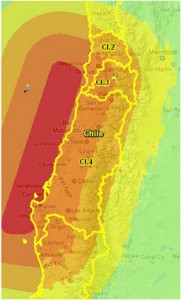The earthquake that struck Chile on February 27 was an 8.8 magnitude event, making it one of the most powerful in history. The earthquake killed hundreds of people and damaged more than one million homes. Preliminary estimates suggest economic losses in excess of $15 billion, with one quarter to one half of those losses covered by insurance. Even without taking into consideration the consequences of the follow-on quakes, this is likely to be one of the most expensive disasters for the global insurance industry. Chile is at particular risk for its location along one of the most active seismic zones in the world, the Pacific Ring of Fire. During my lifetime, Chile has experienced 13 earthquakes of at least a 7.0 magnitude, but most were removed from populated areas. Chile is well prepared to withstand earthquake shocks; it has appropriate building codes and a developed insurance market Indeed, even though the Chilean quake was 500 times more forceful than that of Haiti, it sustained several hundred casualties as compared with 250,000 in Haiti. It will likely take at least four years for the Chile to rebuild, owing to significant losses to its economy. With a recent seismic event in Turkey, this is a sad reminder that natural disasters pose the greatest risks to those with the least to lose.
Archive for March, 2010
Chile’s Recovery from Earthquake Likely to Take Years
Sunday, March 14th, 2010Temporary Reprieve for Flood Insurance
Wednesday, March 3rd, 2010Following an earlier post, the U.S. Senate approved a 30-day extension in the National Flood Insurance Program. I am betting that on Day 29, we will still have no resolution as to the Program’s status on a longer-term basis. Congress appears to favor stop-gap measures rather than dealing with the issues in a way that would allow for businesses to plan their risk management programs and insurance coverage.
Gap in Flood Insurance Program
Monday, March 1st, 2010Consistent with its past practice, Congress allowed the expiration date of the National Flood Insurance Program to pass without timely action, allowing the program to lapse. “Failing to act in time – again – and allowing the National Flood Insurance Program to expire is disconcerting,” said Jimi Grande, senior vice president of federal and political affairs for the National Association of Mutual Insurance Companies. “If nothing else, this episode should make it clear that short-term extensions, which can be blocked by any Senator or congressional caucus, are untenable.” The NFIP was brought to the Senate for a vote just days before the program was set to expire, leaving inadequate time for the procedures required to renew the program. If recent history is any guide, the lapse will be of short duration, as the most recent extension was authorized at the end of December after the program had lapsed for nine hours. Nevertheless, after flooding in areas affected by the three blizzards that struck the eastern states this past month, Congress’ apparent indifference to the issue of flood insurance and disaster mitigation is disappointing.
